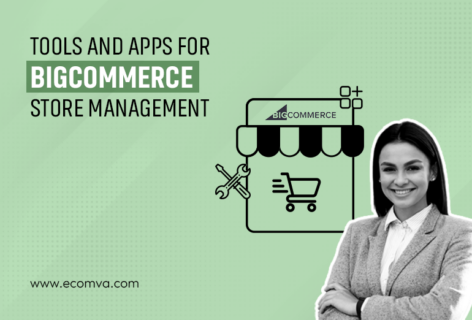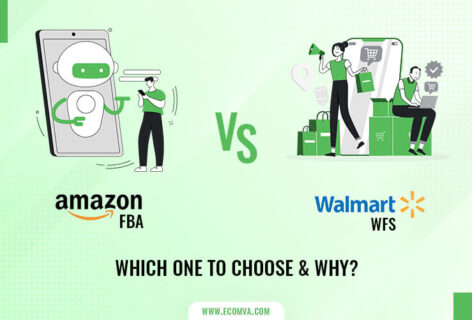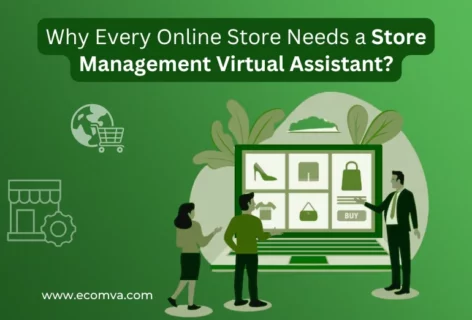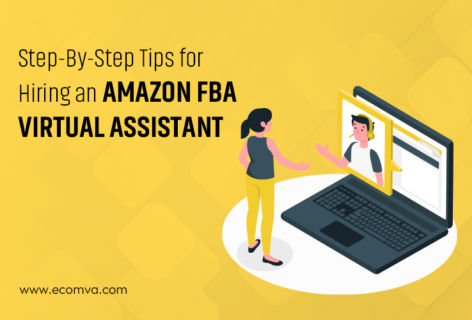Top 5 Factors to Consider When Outsourcing Ecommerce Product Data Entry Services
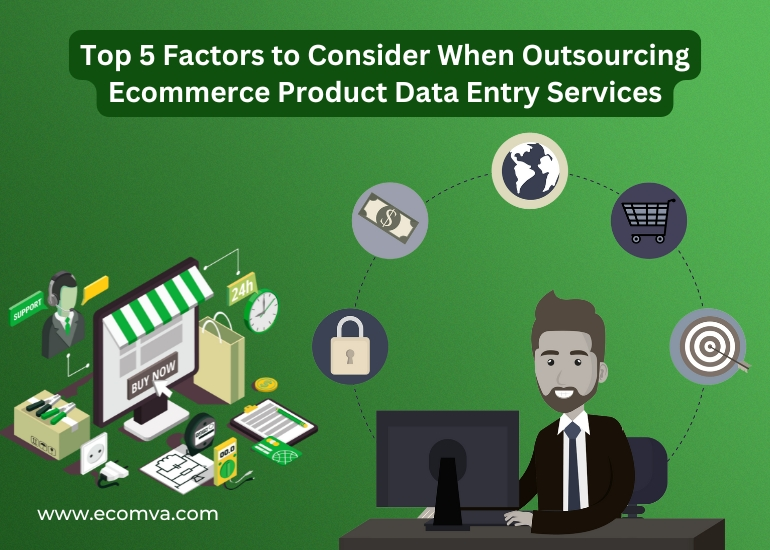
Operating an ecommerce store in the current marketplace is thrilling and daunting. The perspectives are huge, but there is a lot of competition. Between maintaining customer service, creating campaigns, negotiating with suppliers, and streamlining logistics, store owners are often spread thin. One activity that always takes up precious time? Product data entry. On the surface, entering product information could be a straightforward task—loading pictures, typing up descriptions, and inputting SKUs. But here’s the reality: even a tiny discrepancy can cascade into missed sales, increased return rates, and annoyed buyers. That’s why a lot of brands outsource Ecommerce Product Data Entry Services to maintain their stores as neat and manageable as possible.
However, outsourcing should not be taken lightly. Let’s go through the top five considerations to make before you outsource ecommerce data entry, based on eComVA, a trusted ecommerce VA brand.
1. Accuracy and Consistency in Listings
Imagine this: a consumer clicks on a listing for a leather wallet. The heading reads “Brown Leather Wallet,” but the picture is of a black one. The description discloses RFID protection, but the specifications section does not mention it. The customer goes out the door, and possibly never comes back.
Precision and consistency are more than nice to have. They are needed.
Why Accuracy Is Important
- Customer trust is delicate. One mismatch in product information can appear sloppy and amateurish.
- Mistakes are expensive. Incorrect dimensions, ambiguous materials, or incorrect SKUs may prompt returns, refunds, and bad reviews.
- Compliance with marketplaces. Amazon, Walmart, and eBay have rigorous listing guidelines. Errors can lead to fines or exclusion.
How to Ensure Accuracy
A good data entry outsourcing company should put in place the following:
- Layers of quality control. Multiple checks to identify mistakes.
- Batch verification. Random sampling of a group of listings for consistency.
- Platform expertise. Shopify’s understanding differs from that of WooCommerce or Magento; each platform has its own unique traits.
Practical tip for sellers: Develop a uniform model of product data before outsourcing. This is so suppliers understand precisely how to structure product titles, bullet points, and SKUs, leaving less room for error.
eComVA’s solution: Their product upload services include descriptions, prices, images, and SKU organization, which ensures that stores are consistent on different platforms. Outsourcing here is basically limiting your chances of making brand-hurting mistakes.
2. Scalability and Turnaround Time: Can They Keep Up?
Your business doesn’t stand still; it evolves, shifts, and expands. The question is: can your outsourced partner keep pace with you?
Why Scalability Is Non-Negotiable
- Seasonal spikes. Black Friday, Cyber Monday, or holiday launches typically involve uploading thousands of items in a matter of days, not weeks.
- New vendors. Growing your catalog in a hurry necessitates quick product upload.
- Flash sales. Upload delay translates into lost opportunities and revenue.
Indications of a Scalable Partner
- They do high-volume bulk product data entry work, not isolated uploads.
- They have sufficient personnel and processes to scale without compromising quality.
- They are used to tight time campaigns typical of American retail (ie, Thanksgiving promotions or back-to-school).
Example Scenario: A Shopify-based US store that sells home decorations doubled its inventory before Christmas. Rather than turning to in-house temps, they relied on outsourced ecommerce product list services that would load thousands of SKUs in days. Result: The store caught the holiday rush without clogs, handling a 45% spike in traffic and a 30% increase in sales seamlessly.
Another perspective to keep in mind: Most ecommerce traders list in several markets at the same time – Amazon, eBay, Walmart, and Etsy. A scalable team of outsourcers can coordinate product information across sites, maintaining consistent branding throughout.
In essence, you can fully devote time to your marketing or customer engagement, and they do the heavy lifting of product data entry in bulk.
3. SEO Optimization and Visibility
Here’s the reality: getting product information uploaded is just half the fight. If nobody discovers your listings, your store is nonexistent. That’s the reason SEO needs to be baked into your data entry process.
Why SEO-Powered Listings Are a Winner
- More visibility. Consumers can’t purchase what they can’t discover.
- Improved rankings. Titles, descriptions, and optimized tags make listings higher in Google, Amazon, and Shopify.
- Better conversions. Carefully written copy doesn’t simply inform—it convinces.
What to Look for in SEO-Incorporated Data Entry
If you outsource ecommerce product data entry services, make sure they also offer:
- Keyword-optimized descriptions that reflect customer search patterns.
- Alt text optimization for every image on the product (an important consideration both for SEO and accessibility purposes).
- Categorization and tagging so that users can navigate more easily.
Practical advice for salespeople: Leverage research trends locally. For example, a salesman who sells to American consumers should use keywords like “free shipping in the US” or “Made in USA” in titles or descriptions, if applicable.
eComVA benefit: Our team combines the Best Ecommerce SEO Services with ecommerce product list services, making listings not only correct but search-optimized. That’s a huge advantage when selecting a data entry outsourcing firm.
4. Proven Track Record Because Numbers Don’t Lie
Anybody can say they’re “the best.” What you want are hard facts and proven performance.
Why You Need to See Numbers
- Credibility: A company with a portfolio of hundreds of projects demonstrates reliability.
- Experience: Previous work across industries means fewer surprises for your business.
- Retention rates: High client retention translates to satisfied customers.
eComVA’s Track Record
Here’s what sets them apart:
- 99% customer retention ratio, which is rare in the outsourcing industry.
- 250+ certified professionals skilled in ecommerce, data entry, and digital marketing.
- 3,100+ projects delivered for global ecommerce brands.
Pro tip: Ask for case studies. If you are a fashion retailer, look for suppliers who already work with clothing salespeople. Specific industry experience usually means faster integration and fewer errors.
5. Cost Efficiency vs. Value: Choose Wisely
Price will always be an issue, but here’s the error many U.S. ecommerce store owners make: going after the cheapest bidder.
The Secret Cost of Inexpensive Outsourcing
- Weakly optimized listings that fail to rank.
- Entry-ridden creations that result in customer complaints.
- Missed deadlines during peak sales periods.
Solving Price vs. ROI
Instead of wondering “How cheap can I do this?” wonder:
- Will this provider’s accuracy help me avoid expensive returns?
- Can their SEO assistance boost my sales?
- Do they offer scalable bulk product data entry services to keep up with growth?
eComVA Perspective: Hiring a full-time ecommerce VA in the US can cost up to $ 5,600/month, but outsourcing abroad usually reduces costs to only one-fifth. Instead of just saving money, you are gaining SEO experience, scalability, and integration – factors that directly affect revenue.
Additional consideration: Factor in opportunity cost. If your team spends 40 hours a week on product uploads, that’s 40 hours they’re not spending on strategic tasks like ad campaigns or customer retention.
Why is eComVA the Best Partner for Ecommerce Businesses?
If you’re evaluating partners, eComVA checks all the critical boxes:
- Accuracy & Consistency: Professional handling of descriptions, pricing, images, and SKUs.
- Scalability: Capacity to handle regular uploads and huge seasonal dumps.
- SEO Integration: Integration of ecommerce product data entry services with the best ecommerce SEO services.
- Proven experience: Retention of 99%, more than 250 professionals, more than 3,100 projects.
- Cost Efficiency: Economic outsourcing without sacrificing quality.
That combination sets them apart from merely being a data entry outsourcing firm. They’re a growth partner for your ecommerce business.
Final Takeaway
Outsourcing ecommerce product data entry services is not about delegating tedious tasks. It’s about selecting a partner who can make your business flow better, rank better, and grow faster.
Here’s your shopping list when considering providers:
1. Accuracy and Consistency
2. Scalability and Turnaround Time
3. SEO Optimization and Visibility
4. Proven Track Record
5. Cost Efficiency vs. Value
When you find a partner who excels in all five areas, such as eComVA, you’re not just outsourcing; you’re elevating your entire e-commerce process.
FAQs
1. Why outsource ecommerce data entry rather than doing it internally?
Outsourcing conserves time, reduces labor expenses, ensures accuracy, and provides access to expert SEO and listing optimization skills.
2. Are outsourced teams able to do bulk product uploads on Shopify or Amazon?
Yes. Many providers, such as eComVA, have experience with mass product data entry services on platforms like Shopify, Magento, WooCommerce, Amazon, and Walmart.
3. How can I make sure a provider is reliable?
Look for measurable results: retention rates, project volume, customer feedback, and proven expertise in data input and SEO.

